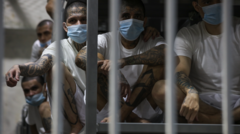**The proposed swap has sparked a heated dialogue between Salvadoran and Venezuelan governments, with accusations and demands for clarity on the legal status of deportees.**
**El Salvador Proposes Controversial Prisoner Exchange with Venezuela**

**El Salvador Proposes Controversial Prisoner Exchange with Venezuela**
**In a bold move, El Salvador's President Nayib Bukele offers to exchange Venezuelan deportees for political prisoners held in Venezuela amid rising tensions.**
In a surprising diplomatic gesture, El Salvador's President Nayib Bukele has proposed a prisoner swap with Venezuela, offering to repatriate 252 Venezuelans currently deported from the United States in exchange for an equal number of political prisoners held in Venezuela. This proposal comes as significant tensions persist between the two nations, particularly under the leadership of Venezuelan President Nicolás Maduro.
Bukele's message was directly addressed to Maduro through social media, where he classified many of the deported Venezuelans as alleged gang offenders involved in violent crimes, specifically citing charges of "rape and murder." Contrarily, Bukele argues that the individuals imprisoned in Venezuela are there solely for opposing Maduro's government, a claim Maduro's administration has denied.
Venezuela's reaction was swift, with chief prosecutor Tarek William Saab challenging Bukele to clarify the specific crimes alleged against the deported individuals. He also demanded transparency about whether these individuals had received fair legal representation or been presented before a judicial authority. The Maduro government has persistently dismissed assertions that political prisoners exist within its prison system, despite ongoing human rights concerns expressed by various activist groups.
In his social media outreach, Bukele outlined a comprehensive plan in which the exchange would secure the release of not just the Venezuelans but nearly 50 others of different nationalities, including U.S. citizens. The U.S. recently deported over 200 Venezuelans to El Salvador, amid allegations that many belonged to the Tren de Aragua criminal group, a notorious gang active in both Venezuela and its neighboring countries.
Contradicting Bukele's claims, Maduro has condemned the deportation process, labeling it as "kidnapping" and a gross violation of human rights. As developments in international immigration policy unfold, particularly under U.S. President Donald Trump’s administration, this proposed swap underscores the complex interplay of diplomacy, migration, and human rights in the region.
Trump's administration has faced considerable legal scrutiny regarding its stringent immigration policies, which have prompted lawsuits and challenges. Recently, a ruling from the U.S. Supreme Court temporarily halted the deportation of suspected Venezuelan gang members, reinforcing the contentious issue of mass deportation under the Alien Enemies Act, a law with historical precedence only utilized during wartime.
Both nations are now positioned at a critical juncture concerning their citizens, with Bukele's audacious proposition highlighting the pressing need for dialogue and resolution within the tangled landscape of international relations, crime, and human rights.
Bukele's message was directly addressed to Maduro through social media, where he classified many of the deported Venezuelans as alleged gang offenders involved in violent crimes, specifically citing charges of "rape and murder." Contrarily, Bukele argues that the individuals imprisoned in Venezuela are there solely for opposing Maduro's government, a claim Maduro's administration has denied.
Venezuela's reaction was swift, with chief prosecutor Tarek William Saab challenging Bukele to clarify the specific crimes alleged against the deported individuals. He also demanded transparency about whether these individuals had received fair legal representation or been presented before a judicial authority. The Maduro government has persistently dismissed assertions that political prisoners exist within its prison system, despite ongoing human rights concerns expressed by various activist groups.
In his social media outreach, Bukele outlined a comprehensive plan in which the exchange would secure the release of not just the Venezuelans but nearly 50 others of different nationalities, including U.S. citizens. The U.S. recently deported over 200 Venezuelans to El Salvador, amid allegations that many belonged to the Tren de Aragua criminal group, a notorious gang active in both Venezuela and its neighboring countries.
Contradicting Bukele's claims, Maduro has condemned the deportation process, labeling it as "kidnapping" and a gross violation of human rights. As developments in international immigration policy unfold, particularly under U.S. President Donald Trump’s administration, this proposed swap underscores the complex interplay of diplomacy, migration, and human rights in the region.
Trump's administration has faced considerable legal scrutiny regarding its stringent immigration policies, which have prompted lawsuits and challenges. Recently, a ruling from the U.S. Supreme Court temporarily halted the deportation of suspected Venezuelan gang members, reinforcing the contentious issue of mass deportation under the Alien Enemies Act, a law with historical precedence only utilized during wartime.
Both nations are now positioned at a critical juncture concerning their citizens, with Bukele's audacious proposition highlighting the pressing need for dialogue and resolution within the tangled landscape of international relations, crime, and human rights.


















